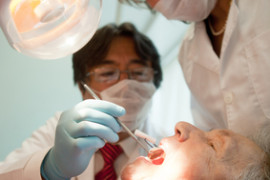New research from Case Western Reserve University may soon have physicians recommending periodontal therapy for patients with the Human Immunodeficiency Virus (HIV).
The research, published in Virology, suggests that HIV patients with periodontitis may experience increases in their viral load, apparently due to the remnants of two pathogenic oral bacteria, Porphyromonas gingivalis and Fusobacterium nucleatum.
P. gingivalis and F. nucleatum are both extremely common and extremely harmful and have been implicated in many serious health conditions, including heart disease, diabetes, pregnancy complications, and colorectal cancer.
The remnants of these bacteria—short chain fatty acids—appear to reactivate HIV-1 in latent T-cells and cause the virus to replicate.
HIV-1 is by far the most widespread and most easily transmissible type of HIV in the world, and it is more likely to progress quickly than HIV-2.
Antiviral therapy does not affect this latent virus, and this, according the researchers, explains why “HIV patients with severe periodontitis have high levels of residual virus in their saliva and plasma despite effective therapy.”
Last year, this same research team published a study linking short chain fatty acids from P. gingivalis and F. nucleatum to Kaposi’s sarcoma, a type of oral cancer that is found primarily in HIV patients.
These two studies alone seem to indicate a connection between pathogenic oral bacteria and poorer outcomes for patients with HIV. Indeed, these pathogens cause plenty of problems for patients who are not immunocompromised—it makes sense that addressing periodontal disease and the pathogens that cause it would lead to an overall improvement in health for those with HIV.



